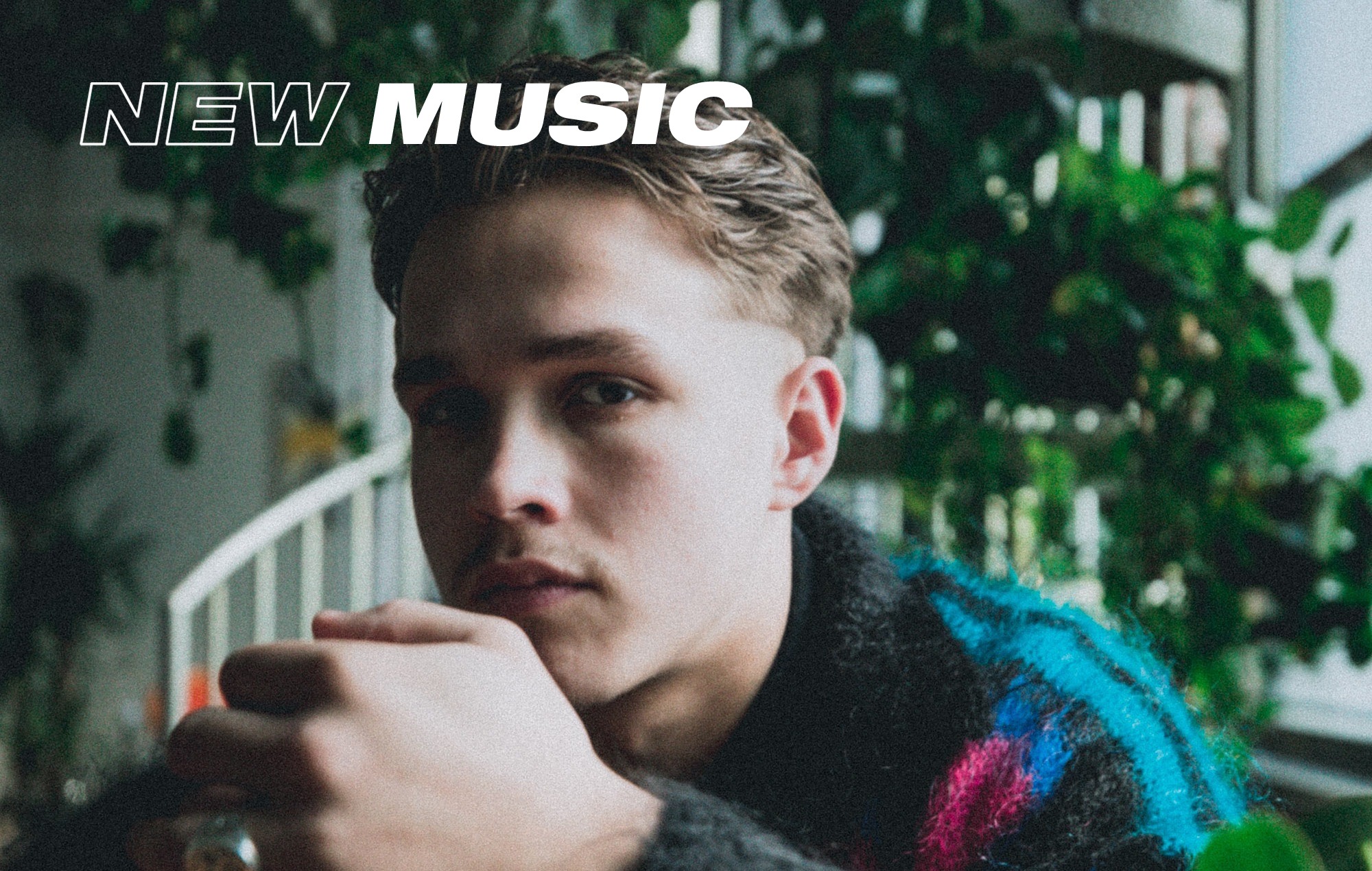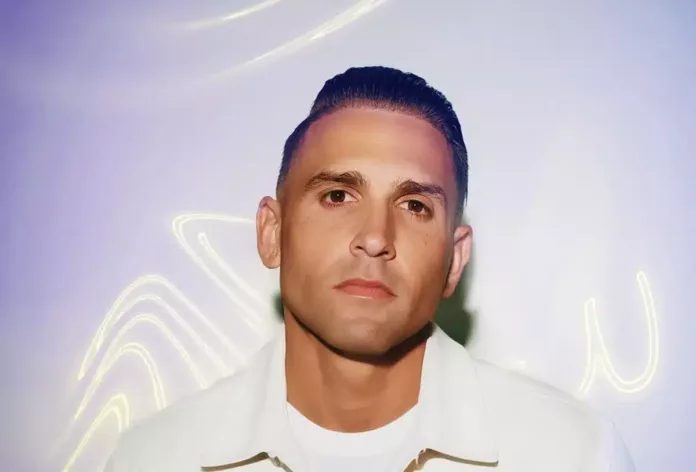
Oliver Malcolm: Fired-up producer-turned-pop renegade ready to give “music a kick up the arse”
Oliver Malcolm isn’t someone to mince his words, or pull his punches. Five minutes into our phone call and the Swedish-born, British-bred producer and songwriter – speaking from his adopted home of Los Angeles – is already taking shots at what he deems as the dire state of music right now.
“One thing I don’t want to do is make the same shit as everyone else,” he announces. “Because everyone else is already doing that, and it’s fucking atrocious. So I’m like, ‘Alright, let me try and do something new here’. Then people might be a bit excited about where music is going in the future.”
This kind of unbridled, unfiltered and unapologetic self-belief runs throughout the entire conversation; the 20-year-old – who recently signed to Interscope offshoot Darkroom [Billie Eilish, Max Leone] – is clearly someone who knows where he wants to be and appears hell-bent on making damn sure it happens. “Music needs a kick up the arse,” he says at one point, adding: “It needs some dynamite shoved up its crack and I will be that dynamite.” Later, he proclaims emphatically: “I’m gonna set fire to this whole biz and tap-dance on it like I’m Charlie Chaplin.”
At times, Malcolm’s grandiose words resemble offcuts from a lost Kanye West and Zane Lowe interview (“The music that’s coming out of me is greater than me. It’s not me making it, it’s a higher power saying, ‘this is your purpose, go do this shit’”), other moments he veers into surrealist, Charlie Sheen-like terrain (“Music is something in me, like a creature. I have to go and purge it… every day in the studio, I shed my skin like a snake”). But he’s acutely aware of his gobbyness too, which definitely helps a great deal with his natural likability. “I like talking,” he admits. “I have a loud-arse voice, it used to get me in trouble in school.”
His cockiness isn’t without reason either. At 20, Malcolm has already found a firm footing as a producer, working with everyone from Joey Badass and MF Doom to Tinashe and AlunaGeorge. Now he’s put a pause to his production career and, after a handful of solo singles, is set to release his debut EP, a genre-blurring eight-track collection that’s as eccentric as its creator: bouncing between slick R&B, West Coast hip-hop, reggae influences by the way of ‘Sandinista!’-era Clash and Jamie T-indebted pepped-up punk.
“I’m gonna set fire to this whole biz and tap-dance on it like I’m Charlie Chaplin”
Malcolm can credit the same bloody-mindedness, drive and determination that’s in abundance during our chat for getting him to where he is today. Growing up in a small English countryside town, his family moved to LA when he was 16 years old, just two weeks after Oliver finished his GCSEs. A hip-hop loving teen with dreams of becoming a producer, the move couldn’t have been more perfect for Malcolm, known then by his music-making moniker of Bigg Kid.
Suddenly surrounded by the industry’s who’s-who, he wasted no time in shopping his name around town; a backpack-wearing kid showing up at Beat Battles (think rap battles for aspiring producers) to hand out USBs of his work.
“I touched down in America and it’s like my mind suddenly flipped,” he remembers. “I was like, ‘let’s fucking go’. Since the day we touched down, I had the mentality of a hungry fucking dog, and was ready to bite anybody’s neck off for it. I wanted there to be no way that nobody would not know my name… I was just hustling. I was going everywhere, meeting everyone. At that time, I wanted to be the biggest producer in the world. I wanted to be like Dr. Dre.”
For a while, it seemed that Malcolm was destined for work behind the boards. An early pinch-himself moment came when Top Dawg rapper and Kendrick collaborator Jay Rock jumped on one of his beats. “I still remember hearing the song he wrote over it and running around my house like ‘Mum! Oh my god! I made it!’”, he recently recalled to i-D.
Next thing, Oliver was in the studio with Cee-Lo Green, despite having still not yet reached drinking age in the UK, let alone the U.S. “I was sitting in the studio playing shit for Cee-Lo, seeing him do his shit. An experience like that at 17 was so fucking fire. Musically, that’s high level.”
Sometimes what you wanted doesn’t end up being exactly what you had envisioned though, and – like one Kanye West before him – Malcolm soon became frustrated with being in the backseat, eventually realising that he could be far more hands-on artistically: “I started getting placements, producing for other people and getting what I thought I wanted. But I was thinking, ‘Actually this isn’t what I thought it was going to be.’”
Plenty has been said about the murky details of modern music-making – a world of endless ghostwriters, production boot camps, artists operating as curators – and although he doesn’t name names, Malcolm isn’t shy when he talks about the moment he realised he was just as creative as the stars he had previously looked up to.
“Once I finally got into the studio with known, respectable artists, it was almost like the curtain was raised in front of me. It was just someone stood behind a mic experimenting. They’d make like 10 songs and the 10 songs fucking sucked. Then they’d make one and be like, ‘oh, this is dope’. I was like, ‘to make one dope song, you made 10 wack things?’ It dawned on me that it was just like producing.”
Just as things were beginning to pick up though, Malcolm found himself on a flight back across the Atlantic. “Boom, the Visa was up and I had to go back to the UK,” he explains. For the next year, Malcolm would relocate to the capital, discovering London for the first time while working on his tirelessly own music in a makeshift studio at the back of an auto-repairs shop where he could make as much noise as he liked. It’s during this time that he took to educating himself on the city’s punk heritage, an influence which can certainly be felt on select tracks from his EP.
“There’s a song called ‘The Machine’ and that’s the first time of me bringing that punk energy,” he explains, citing the likes of The Clash and The Damned as bands he’d been listening to at the time. “I wasn’t thinking so much about it at the time, but some of the music I wrote definitely derived from the feeling that listening to this kind of music gave me.”
“Everything you hear on the EP is experimentation. That’s what you’re hearing, me experimenting,” Malcolm adds. It’s true that it’s a diverse and eclectic collection – ‘Kevin’ sounds like a Gorillaz earworm, while ‘Switched Up’ and ‘Looks’ have more of a sparkling Cali vibe, almost Anderson.Paak-ish.
It’s the track ‘Helen’, however, which grabs your attention the most, with Malcolm gravitating towards truly weird sounds – strange, obscure vocal samples, warped guitars and a demented vocal delivery – that, when looped, begin to make sense. It’s this route that you can see Malcolm going down when he says that he’s beginning to “hone a unique sound to me… so much stuff blended together that it’s new and hasn’t been heard before.”
Workaholics often tend not to dwell on the past, instead moving on to the next thing, and Oliver – now back in LA full-time – seems to have his attention more focussed on the full-length record he’s currently creating, rather than the EP he’s meant to be promoting.
“I’m working on an album right now so I’m fully in that world,” he says. “What I’m doing after the EP is that I’m honing in on a sound, a feeling, and advancing so much”. He later describes it, with little modesty but tongue slightly in cheek, as the “best album ever”.

Despite having his mind focussed on solo stardom (“If I would have just continued to make music for others then I wouldn’t have been fulfilling my purpose,” he says), you shouldn’t rule out Oliver returning to dabble with the production world every now and then. “You’ll definitely see my credits on other people’s songs. Whatever it is, it’ll be dope… If Kanye was like, ‘yo, let’s go do some shit’, dude, of course I would [collab]. Kanye, Kendrick, Kid Cudi… there’s a bunch of different people I’d like to collaborate with. I feel like I could make a very, very, very good album with Kendrick.”
At the end of our call, we return to the topic of Malcolm’s upcoming album. We ask what it’s sounding like, and he hesitates – perhaps for the first time in the entire interview – before replying: “It sounds like the soul. Not soul music, the actual soul. Actually, it doesn’t sound, it feels. It doesn’t sound like anything, it feels like everything. That’s what you should say… it’s a great pull quote!”
Oliver Malcolm’s debut EP is out this Autumn



